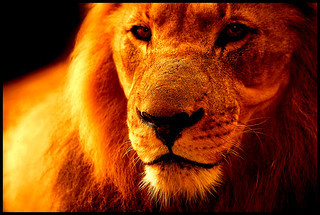Paul Alkazraji's Blog - Posts Tagged "c-s-lewis"
Sweet dreams...
 The Last Battle by C.S. Lewis
The Last Battle by C.S. LewisMy rating: 5 of 5 stars

Aslan: sweet dreams...
“I'd been having strange dreams about lions when I began writing the work,” says C.S. Lewis of Aslan, the Christ-like character who appears at the defining hour in this seventh and final novel in The Chronicles of Narnia: a fantasy series for children - and grown-ups.
It is a story of adventure, danger, suspense and hope with insightful parallels to the times in which we live in our world. Early on, Roonwit the Centaur warns King Tirian that strange and evil things are happening to Narnia, and that the stars portend ominous developments. We meet Shift the Ape, who opposes and substitutes himself in Aslan’s place by throwing a lion skin over a stiff-legged donkey, which he controls to dupe the Narnians: a clear parallel to the Antichrist in the Book of Revelation. We see too the folly of those who believe in no god at all who conflate good and evil by calling them one in ‘Tashlan’. “The Calormenes use different words but we all mean the same thing,” says the lying Ape.
We follow characters who face up to the reality that if Aslan were not the one they have believed in and longed for, it would be ‘as if the sun rose one day and were a black sun, or as if you drank water and it were dry’. We come upon a band of dwarfs whose faith in Aslan has been so undermined that they now live only for their own interests. They have become ‘so afraid of being taken in that they cannot be taken out’.
Then during the ‘last battle’ of the book’s title, fought before the door of a stable, we see the deep confusion present, and the faithful remnant hopelessly outnumbered. In such ‘last days’ that we live in, days of intensifying persecutions, rising emergencies and disasters, and where a person can ‘be howled down for saying that two and two make four’, just as the Narnians are when they question the Ape’s lies, there is much reality to rue in this fantasy fiction.
There is too the most vivid of scenes where all living creatures are called across the land to look straight into Aslan’s face. For some, their expressions change to fear and hatred before turning to Aslan’s left to disappear into his shadow. Others look on the face of Aslan and love him, and come in at the Door to his country.
Lewis’ use of certain language, considered mild in its day, has caused some critics to inflame themselves in their zeitgeist zeal to label him a racist, finding a nick and trying to drive a wedge in it. The notion of a true God above false ones and cultures who worship at their altars is an idea here that for some too is an offence beyond tolerance. There are warnings for all of us in Aslan’s shadow. Any dislike of the notion of it does not remove it from the Narnians.
In scenes to cherish, though, Aslan’s country is portrayed as richer in colour and more like the real thing than the Narnia they have always known. There, a great reunion of heroes and long-lost loved ones awaits. It is a place where the children who came to Narnia’s aid sprint further up and further in. ‘For them it was only the beginning of the real story… Chapter One of the Great Story which no one on earth has read’.
In Acts 2.17 it says: 'In the last days, God says… your old men will dream dreams.’ Not so strange, then, that it should be so for Lewis.
By this reviewer:

View all my reviews
Published on November 28, 2019 09:41
•
Tags:
aslan, c-s-lewis, christianity, narnia, the-chronicles-of-narnia



